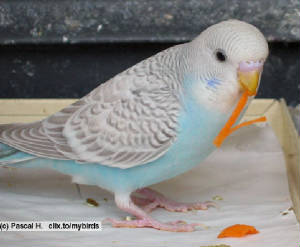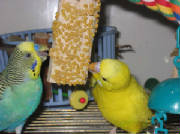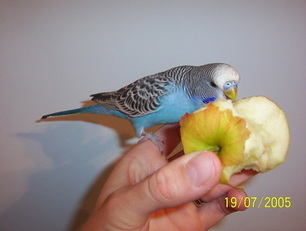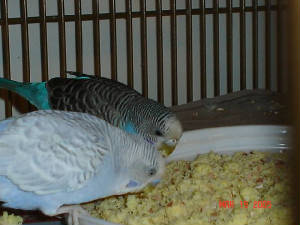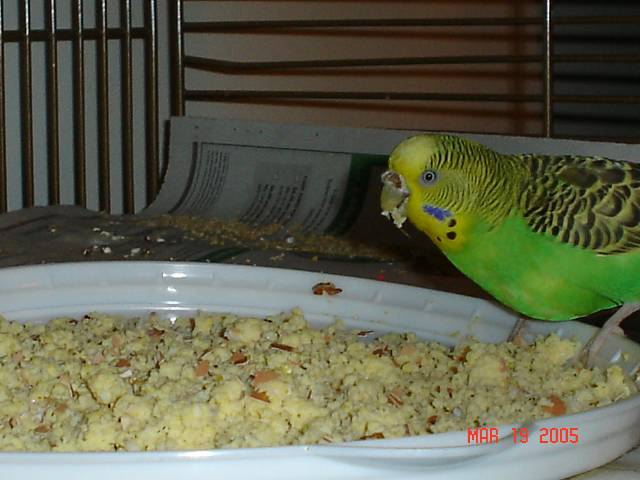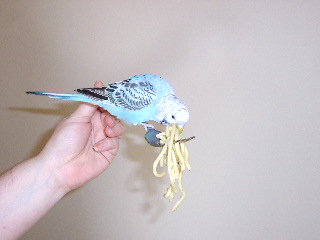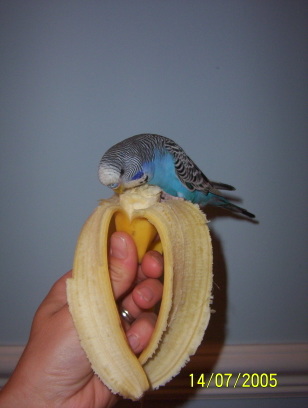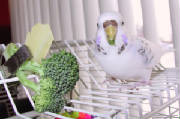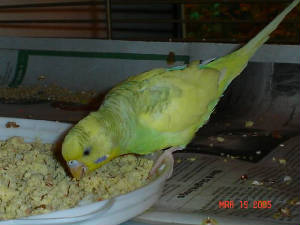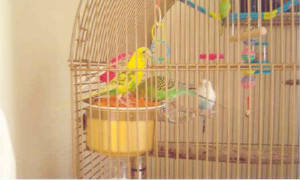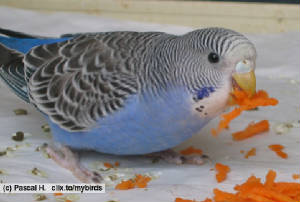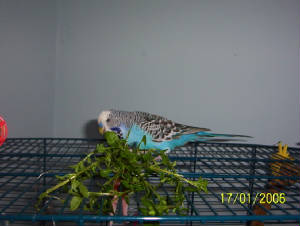|
| willow & bluebell enjoying some egg food |
|
|
birds like people need good food to help them live
long & happy lives.
If a budgies is feed a good diet of seeds, pellets
, fruits & veggies ( a trear here & there or now & again won't hurt either)
they can live up into there early 20
| kiwi enjoying some egg food |
|
|
| a bird who love his fruits & veggies |
|
|
| thanks to budgieover from just budgies |
tips on getting your bird to eat new things
( thanks to dizzy dezzy from tailfeathers )
1) What colors do your birld like/dislike? Any
in paticular? If they do like some, try foods of that color, as they will be more willing to check it out sooner. If you know
they avoid certain colors (dislike them), don't offer those.
2) Whenever
you are home, have veggies in their cage. They need to be changed every 2-3 hours (so they don't spoil), so try to have them
in their cage as much as possible.
3) Present the food in diff ways. Offer
it in tiny bits, minced, diced, chopped, grated, whole, etc. Some will not touch whole foods, but if you chop it up, they
love it!
4) Choose 3 or 4 different foods to offer, and rotate/mix them
only; for a few months. This is so he can get used to the look, and hopefully, taste, of them.
5) What is his staple food? Try peeling a banana, cut off an 1 inch section, and scrape off the sides, so it
is sticky. Roll it in seeds/pellets, and offer.
6) Try offering seed/pellets
for 1 hour in the morning, then only have veggies in the cage during the day. Offer seed/pellets again in the evening for
1 hour. After a few days, they will usually try the new foods. Be sure it is in a food dish (so they know it is suposed to
be eaten ).
7) For some birds, all it takes is mixing the chopped up veggies
with their regular food, and they will try it .
 YOU eat some while theya re out! Say "Mmmm" with big smiles, any enjoyment noise/gesture you
have a habit of doing, and offer it to your bird. Eat it outside of the cage while some is with your bird in the cage. Do
NOT feed your bird out of your mouth. They have germs that can make you sick, and you have germs that can make the bird sick! YOU eat some while theya re out! Say "Mmmm" with big smiles, any enjoyment noise/gesture you
have a habit of doing, and offer it to your bird. Eat it outside of the cage while some is with your bird in the cage. Do
NOT feed your bird out of your mouth. They have germs that can make you sick, and you have germs that can make the bird sick!
Also:
Poisonous:
Avacado
Alcohol
Onion
Caffine
Chocolate
Bad for Them:
anything high
in preservatives
white rice
sunflower seeds (in large amounts, once and awhile are fine as treats)
most nuts (in
large amounts, once and awhile are fine as treats)
honey
sugary foods (not natural sugar (fruits)- added sugar, such
as in some of the so called treats at the pet store used to 'glue' the seeds together). |
 |
|
| rainbow enjoying some egg food |
|
|
Food mistakes with birds
Here are some common big mistakes some inexperienced bird owners can and have made. Most of these
seem to happen with small birds, such as budgies (parakeets) and cockatiels.
- "The bowl looks full but it's not!" Learn how to recognize eaten seed vs. edible
seed. Birds who eat seed leave behind hulls that can be mistaken for whole seeds. I've heard of owners leaving the food bowl
in without changing it for days, resulting in a bird that starves to death "with a full foodbowl." (Food and water should
be replaced daily at minimum.)
- "If it's not on the ground, it's not food." Some young birds, especially young
budgies, don't know how to eat (or drink) from their new bowls. They don't recognize the contents as food; they only know
how to eat seed off the cage floor. If you notice a new bird not eating from its bowl for a long time, you may want to try
lowering the foodbowl and/or putting a shallow saucer of food on the floor for the bird to see if it eats from there. (Some
young birds don't yet understand clear bowls -- they try to eat through the clear walls -- so you may need to show your bird
which part of the bowl is open.) Experiment and try different ways of teaching the bird where to get its food.
- "Where's my water? I can't find any!" The same applies to water as with food:
young birds don't know that a particular container contains water. Try showing the bird the water moving around in the container,
or get a little drop to drip from the edge near the bird. After a while, the bird usually gets the idea that there's water
in the container. If switching to water bottles: show the bird how the water bottle works (make sure it sees
water dripping from the nozzle, etc.), and never switch completely away from a bowl until you're really sure the bird knows
how to drink from the water bottle. Watch for "jammed up" water nozzles whenever you clean and refill it -- make sure the
bird can get water from it when you put it back.
- "Is that all I get??" It's safer to over-feed a bird at first, rather than risk starving
the bird. Reduce quantities only once you get a good feel for how much the bird needs. Experiment to make sure you're right.
Birds can get fat, especially on some diets, but err on the cautious side.
- "You poisoned my water!" Some birds will refuse to drink water with medicine (and/or perhaps vitamins)
added. Observe the bird carefully for the first few days. Know your bird's limits; some birds will give in and get their medicine,
while others will still refuse to drink to the point where it can hurt them. A good vet can find some other way to medicate
your bird, other than the water.
- "I'd rather starve than touch that!" Whether because they hate the food or just don't
know it's food, some birds can and do starve to death rather than eat new foods. (And even if a bird nibbles at something,
it doesn't mean he understands it's food; he might just think it's a chew toy! Make SURE he's swallowing it and knows it's
food!) In switching to new foods, always make sure the bird is eating enough food of some sort to stay healthy (and if you
don't know how much is enough, talk to your avian vet). A very small bird has a high metabolism and requires frequent meals,
so while one night of hunger may be OK for a healthy bird, more than that can be dangerous. Bird Talk magazine, among other
sources, has more information on how to convert birds to new foods.
- "All I want is seed." As stated elsewhere, a seed-only diet is insufficient. Some birds,
especially those that are not tame, may be next to impossible to convert to a healthy non-seed-only diet, but hand-tame birds,
though often stubborn, can usually be converted much more easily. Start young -- young birds are much more willing to try
out new foods. Suggestions on how to teach your bird to eat veggies and pellets.
- "That's REALLY not food for me." It happens that sometimes, really clueless owners
will try to feed the bird something inappropriate, like in the story I read in Bird Talk of an owner trying to feed a toucan
a certain sugary cereal associated with a cartoon toucan -- but real toucans are carnivorous! Make sure you get food appropriate
for your bird.
- "Ewww, my bowl is gross." Clean the water and food containers thoroughly daily!
(More often if there's poop in them.) Tip: to rinse away stubborn detergent, spray on some vinegar, and then rinse thoroughly
in water. (Very useful for water bottles.) Watch for nooks and crannies in bowls and bottles where germs hide, such as the
corners: if the surface feels slimy, you have a bacterial build-up!
- "Not watching the bird eat/drink/play/sleep is OK; it'll be fine." Wrong!!! First time
owners ESPECIALLY need to learn to observe a bird. Learn its body language. Find out how to tell if it's healthy, sick, lonely.
Anticipate its needs; always provide fresh food and water, and make sure it eats and drinks. Do your research; read the bird
magazines, buy the birdie books, and TAKE YOUR BIRD TO A GOOD AVIAN VET. Ask your avian vet all your questions. Don't be afraid
to call up your vet at the first sign of trouble! Birds can get very sick very fast.
- "Beware inobvious poisons." NEVER FEED YOUR BIRD CHOCOLATE. It's poisonous to them.
So is avocado and hence guacamole (parts of the fruit are toxic). No alcohol. No caffeine. No lead, no cigarette butts (cigarette
smoke is bad, too). Watch out for poisonous houseplants, too. NEVER USE TEFLON COOKWARE IN A HOUSE WITH BIRDS.
There are doubtless many other things to know. Do your research: buy/borrow books
and magazines, talk to bird owners, and talk to your qualified avian vet. Good luck!
| can't talk right now got my mouth full |
|
|
| greens are good for budgies |
|
|
| thanks to budgieover from just budgies |
|


